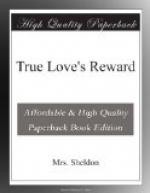But the woman’s curiosity was for the moment greater than her anxiety or remorse, and after a brief silence, she abruptly inquired:
“How did that detective find that box of diamonds?”
“He did not find them. I accidentally discovered them,” Mona replied.
“You? What were you prowling about in my room for?” crossly demanded Mrs. Montague.
“I was simply looking for a pair of scissors which I had left there the day before we went South. But why did you lock me in the room, for I suppose it was you?”
“Because I was desperate,” was the defiant response. “I had just learned how you had escaped from Louis, but I had not a thought of finding you here. When I saw you in my room, however, a great fear came over me that you would yet prove my ruin. I imagined that you had just arrived in New York, and had come here to take away your things, and were perhaps searching my room for proofs of your identity. So on the impulse of the moment I locked you in, intending to make my own terms with you before I let you go.”
“Did you suppose, after my experience in New Orleans, that I would trust myself with you without letting some one know where I could be found?” Mona quietly asked.
“If I had stopped to think I might have known that you would not,” the woman said, sullenly. “But how did you get out of that hotel in Havana?”
“Mr. Justin Cutler assisted me.”
Mrs. Montague flushed hotly at the mention of that name.
“Yes, I know, but how?” she said.
Mona briefly explained the manner of her escape, then inquired, in a voice of grave reproach:
“How could you conspire against me in such a way? How could you aid your nephew in so foul a wrong?”
“I have already told you—to make our fortunes secure,” was the cool retort.
Mona shuddered. It seemed such a heartless thing to do, to plan the ruin of a homeless, unprotected girl for the sake of money.
Mrs. Montague noticed it, and smiled bitterly.
“You surely did not suppose I bore you any love, did you?” she sneered. “I have told you how I hated your mother, and it is but natural that the feeling should manifest itself against her child, especially as you both had usurped the affections of my husband.”
“Such a spirit is utterly beyond my comprehension,” gravely said the girl, “when your only possible reason for such hatred of a beautiful girl was that my father loved and married her.”
“Well, and wasn’t that enough?” hotly exclaimed Mrs. Montague. “For years Walter Dinsmore’s aunt had intended that he should marry me—that was the condition upon which he was to have her fortune—and I had been reared with that expectation. Therefore, it was no light grief when I learned by accident, three weeks after he sailed for Europe, that he had married a girl who had come to New York to earn her living as a milliner. They went abroad together and registered




